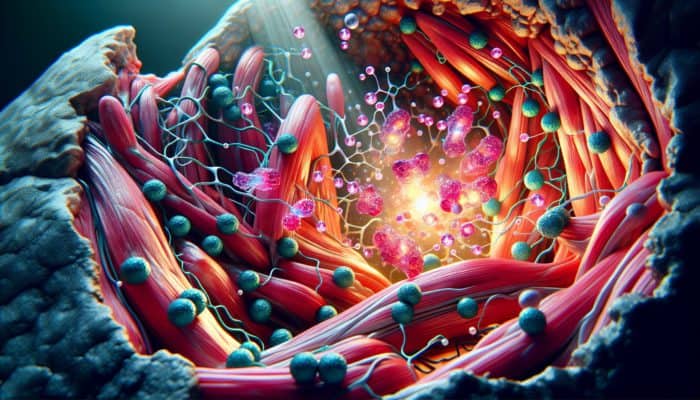Discover the Transformative Advantages of Glutamine for Enhanced Athletic Recovery
Diving Deep into Glutamine: The Essential Amino Acid for Peak Health and Athletic Excellence
Glutamine is widely recognized as a “conditionally essential” amino acid, integral to a variety of physiological functions that are crucial for achieving and sustaining optimal human health. This remarkable amino acid is primarily concentrated in muscle tissue, where it plays a vital role in protein synthesis, a process that is essential for effective muscle recovery and overall physical well-being. During times of physical stress, such as intense training sessions or illness, the body’s demand for glutamine surges significantly. Beyond its essential recovery functions, glutamine serves as a primary energy source for various cell types, particularly within the immune system and the gastrointestinal tract. As sports nutrition continues to evolve, gaining insights into glutamine’s role in recovery becomes increasingly critical for athletes and fitness enthusiasts, leading to a heightened focus on research on glutamine recovery.
The Indispensable Importance of Recovery in Optimizing Athletic Performance
Effective recovery is fundamental to any successful training program. During the recovery phase, muscles engage in crucial repair and growth processes that are essential for enhancing performance and reducing the risk of injuries. In this context, glutamine emerges as a key player, facilitating muscle repair and alleviating the negative impacts associated with extended periods of physical exertion. By aiding in the replenishment of glycogen stores and enhancing protein synthesis, glutamine empowers athletes to quickly resume their training regimens, often with enhanced physical strength and endurance. The necessity for efficient recovery applies universally, transcending cultural and athletic boundaries, and highlighting the global significance of glutamine’s contributions to recovery.
Key Insights from Recent Research on Glutamine and Athletic Recovery
The growing body of research on glutamine recovery consistently uncovers promising findings, with numerous studies examining the effects of glutamine supplementation among athletes as well as non-athletic populations. The results reveal various benefits, including accelerated muscle recovery, improved glycogen replenishment, and a noticeable reduction in muscle soreness. These advantages are particularly significant during periods of physical stress, such as post-exercise recovery or after surgical interventions. As the field of sports nutrition continues to flourish on a global scale, ongoing research endeavors aim to clarify glutamine’s multifaceted role in recovery.
Unpacking the Wide-Ranging Benefits of Glutamine Supplementation

The increasing trend of utilizing glutamine supplementation has attracted considerable attention for its potential to improve recovery, especially among athletes and those participating in high-intensity physical activities. Research indicates that glutamine supplementation can result in reduced muscle soreness and a faster return to peak performance levels. Additionally, glutamine plays a crucial role in supporting immune health, which often suffers during intense training periods. Athletes are at a heightened risk of illness due to the physical strain their bodies undergo, making glutamine an invaluable asset for maintaining overall health and wellness. The global fitness community has widely acknowledged glutamine’s exceptional potential to enhance recovery and boost performance.
Finding Natural Dietary Sources of Glutamine to Enhance Your Nutrition
While the advantages of glutamine supplementation are well-established, this crucial amino acid is also naturally found in a diverse range of foods. Excellent dietary sources of glutamine include protein-rich options such as meat, fish, dairy products, and select vegetables. For individuals aiming to enhance their recovery through nutrition, incorporating these glutamine-rich foods into their meals can provide a comprehensive strategy for optimal glutamine intake. Various culinary traditions across cultures offer numerous ways to enjoy glutamine-rich dishes, ranging from hearty meat-based meals to plant-based options abundant in legumes. By understanding dietary sources of glutamine, individuals can make informed choices that align with their recovery aspirations.
Exploring How Glutamine Facilitates Muscle Recovery
Boosting Muscle Repair and Growth through Enhanced Protein Synthesis

The intricate process of muscle repair and growth relies heavily on protein synthesis, with glutamine playing an essential role in this multifaceted mechanism. Following intense physical activity, muscle fibers sustain micro-tears that require repair to foster growth and increase strength. Glutamine supports this repair process by enhancing the synthesis of proteins that are critical for rebuilding muscle tissue. Furthermore, glutamine helps maintain a positive nitrogen balance, which is essential for effective muscle recovery. Research indicates that athletes who include glutamine supplementation in their routines may experience faster recovery times and improved muscle function, enabling them to exceed their physical limits and achieve new personal bests.
In addition to its direct impact on protein synthesis, glutamine enhances the availability of other amino acids necessary for muscle development. This synergistic effect is particularly beneficial during periods of intense training when nutrient demands are raised significantly. Incorporating glutamine into a post-workout nutrition plan can yield superior recovery outcomes, making it a favored choice among athletes striving to optimize their performance. With the evolution of the global fitness culture, understanding glutamine’s role in muscle repair has become increasingly crucial.
Enhancing Immune System Performance with Glutamine
The efficiency of the immune system can significantly decline during times of physical stress, making glutamine an indispensable component in maintaining immune health. Glutamine acts as a vital energy source for immune cells, enhancing their proliferation and overall functionality. Engaging in high-intensity activities, such as marathon training or competitive sports, elevates the body’s glutamine requirements, potentially leading to a temporary depletion that could hinder immune effectiveness. Emerging studies suggest that glutamine supplementation can help mitigate this risk, thus strengthening immune defenses against various illnesses.
Moreover, glutamine’s role in reducing inflammation is crucial. By modulating inflammatory responses, glutamine not only supports immune health but also aids recovery from exercise-induced muscle injuries. Studies have revealed that maintaining sufficient glutamine levels can enhance immune responses, particularly among athletes. The implications of this research are significant, emphasizing glutamine’s importance in sustaining health during rigorous training regimens worldwide.
Boosting Energy Metabolism with the Power of Glutamine
Energy metabolism represents another critical area where glutamine exerts considerable influence. During recovery, the body demands increased energy supplies to repair damage and restore normal physiological functions. Glutamine serves as an alternative energy source, especially for cells with high metabolic needs, such as enterocytes in the gut and lymphocytes in the immune system. By providing this essential energy boost, glutamine supports the recovery process, ensuring that various cellular functions are effectively maintained.
Research indicates that glutamine can enhance overall energy metabolism, particularly during periods of physical stress. Transitioning to utilize glutamine as an energy substrate can help preserve muscle glycogen stores, which is especially beneficial during prolonged training sessions or competitive events. By facilitating optimal energy utilization, glutamine supplementation can lead to improved recovery outcomes and performance, making it a central focus of interest for athletes worldwide.
Clinical Insights into the Effectiveness of Glutamine Supplementation
Assessing the Impact of Glutamine on Athletic Recovery Metrics
The effectiveness of glutamine supplementation in enhancing recovery and performance among athletes has been a major focus of clinical research. Studies indicate that athletes who incorporate glutamine into their post-exercise routines may experience significant improvements in recovery duration and overall performance metrics. A study published in the Journal of Sports Science & Medicine found that athletes supplementing with glutamine reported reduced muscle soreness and faster recovery following strenuous exercise, underscoring glutamine’s potential to facilitate a quicker return to training intensity.
In addition to subjective recovery experiences, objective measurements—such as muscle strength and endurance—have also shown favorable responses to glutamine supplementation. Athletes engaged in high-intensity training frequently confront fatigue that can impede performance. Research suggests that glutamine can alleviate this fatigue, allowing athletes to maintain higher training loads without extended recovery periods. This aspect is particularly advantageous in competitive sports, where training cycles are often intense and tightly scheduled.
The Impact of Glutamine on Injury Recovery Processes
Injury recovery is another significant area where glutamine showcases substantial potential. Clinical research indicates that glutamine supplementation can expedite recovery from injuries by promoting tissue repair and reducing inflammation. Investigations conducted on patients recovering from surgery revealed that those receiving glutamine experienced faster healing times and fewer complications compared to those who did not receive supplementation. This compelling evidence positions glutamine as a valuable supplement for individuals healing from both surgical and athletic injuries.
Glutamine’s role in supporting tissue repair extends beyond muscle injuries. Research shows that glutamine can assist in the recovery of various tissues, including skin and connective tissues, making it a versatile ally in the healing process. Consequently, healthcare practitioners are increasingly acknowledging the significance of glutamine in rehabilitation protocols, highlighting its broad applicability across diverse populations.
Exploring Long-term Health Advantages Associated with Glutamine
The long-term health benefits of glutamine are gaining increasing attention within the scientific community, particularly concerning gut health and immune function. Emerging research indicates that glutamine plays a crucial role in preserving the integrity of the intestinal lining, which is essential for overall health. A compromised gut barrier can lead to a multitude of health issues, including inflammation and immune dysfunction. Studies suggest that glutamine supplementation can enhance gut health, thereby improving nutrient absorption and immune responses over time.
Furthermore, the implications of long-term glutamine supplementation extend beyond athletes, potentially benefiting the management of chronic health conditions. Research indicates that glutamine can assist in treating conditions like irritable bowel syndrome and various gastrointestinal disorders. The potential for glutamine to provide therapeutic benefits in these areas emphasizes its relevance in a global health context, aligning with the rising focus on gut health and holistic wellness.
Investigating Glutamine’s Role in Cancer Patient Support
The application of glutamine in oncology is an emerging research area with significant implications for patient care. Several studies suggest that glutamine supplementation may improve outcomes in cancer patients by enhancing immune function and alleviating side effects related to treatment, such as chemotherapy-induced nausea and fatigue. Research published in *Cancer Research* highlights the potential for glutamine to enhance the quality of life for individuals undergoing cancer therapies, providing a complementary approach to traditional treatments.
Additionally, glutamine’s role in cellular metabolism can be particularly beneficial for cancer patients, as it supplies energy for rapidly dividing cells, including those in the immune system. By supporting these vital cellular functions, glutamine may counteract the immunosuppressive effects often experienced by cancer patients. As researchers continue to explore this dynamic relationship, glutamine supplementation appears to be a promising avenue for enhancing recovery and improving the overall therapeutic experience for individuals undergoing cancer treatment.
Guidelines for Optimal Glutamine Dosage and Administration Strategies
Establishing the Ideal Dosage for Maximum Recovery Benefits
Determining the optimal dosage of glutamine supplementation can vary widely based on individual needs, activity levels, and specific health objectives. Research typically recommends dosages ranging from 5 to 40 grams per day, tailored to meet the unique requirements of each individual. Athletes engaged in high-intensity training may benefit from higher dosages, while those focused on general wellness might find lower dosages to be adequate.
Many clinical studies advocate starting with lower doses to assess tolerance before gradually increasing the dosage as necessary. This personalized approach ensures that individuals can maximize the benefits of glutamine while minimizing the risk of adverse reactions. As our understanding of glutamine’s role in recovery evolves, emphasizing individualized supplementation strategies becomes increasingly important.
Maximizing Recovery Through Strategic Timing of Glutamine Intake
The timing of glutamine supplementation can significantly influence its effectiveness. For optimal recovery, many experts recommend consuming glutamine immediately after a workout when muscles are primed for nutrient absorption and repair. This strategic timing allows glutamine to effectively support protein synthesis and replenish energy reserves. Additionally, some studies suggest that taking glutamine before bedtime may enhance overnight recovery, as the body engages in critical repair processes during sleep.
Incorporating glutamine into pre- and post-workout routines aligns with the global trend towards more strategic nutritional practices. Athletes and fitness enthusiasts increasingly recognize the importance of timing in maximizing the benefits of supplementation, positioning glutamine as a foundational element of their recovery strategies.
Exploring Various Forms of Glutamine Supplements for Optimal Use
Glutamine is available in several forms, including powders, capsules, and liquids. Each form presents unique advantages and absorption rates, catering to diverse preferences and lifestyles. Powdered glutamine is especially favored among athletes due to its versatility; it can be easily mixed into shakes or beverages for convenient consumption. Capsules provide ease of use for individuals on the move, while liquid supplements may appeal to those who prefer ready-to-drink options.
Selecting the right form of glutamine can enhance compliance and ensure that individuals fully benefit from this powerful amino acid. As global consumers become increasingly health-conscious, the variety of glutamine forms available caters to different preferences and dietary practices, making it more accessible for individuals aiming to optimize their recovery.
Understanding the Potential Side Effects and Safety Considerations of Glutamine
Recognizing Common Side Effects Linked to Glutamine Supplementation
Although glutamine supplementation is generally considered safe for most individuals, some may experience mild side effects. Common adverse effects can include nausea, abdominal discomfort, and diarrhea, which are typically transient and resolve with continued use. It is essential for individuals to monitor their reactions to glutamine and adjust dosages accordingly to minimize any discomfort.
Health professionals often recommend that individuals unfamiliar with glutamine supplementation begin with lower doses to assess their tolerance. By gradually increasing the dosage, individuals can mitigate the risk of adverse effects while fully reaping the recovery benefits of glutamine. This cautious approach aligns with global health recommendations advocating safe supplementation practices.
Understanding Contraindications for Glutamine Supplementation
Certain medical conditions may contraindicate the use of glutamine supplementation. Individuals with pre-existing kidney or liver issues should consult with a healthcare provider before starting supplementation, as glutamine metabolism may place additional strain on these organs. Pregnant or breastfeeding women should also proceed with caution and seek professional advice prior to using glutamine, given the limited research on its safety in these populations.
Emphasizing safety and informed decision-making is crucial in today’s health landscape. Encouraging individuals to seek professional counsel ensures that glutamine supplementation is utilized effectively and safely, maximizing its benefits while minimizing potential risks.
Guidelines for Responsible and Safe Glutamine Supplementation
Ensuring safety while using glutamine supplements involves adhering to established guidelines. Starting with lower doses—generally around 5 grams per day—and gradually increasing can help individuals assess their tolerance while minimizing side effects. Regular monitoring for adverse reactions, such as gastrointestinal discomfort, ensures that supplementation remains beneficial.
Integrating glutamine into a balanced diet and recovery strategy aligns with best practices for health and wellness. As research surrounding glutamine continues to expand, prioritizing safety and informed usage will be essential for optimizing its potential benefits on a global scale.
Future Directions for Advancing the Research on Glutamine
Emerging Trends and Insights Shaping Glutamine Research
Recent trends in glutamine research are unveiling exciting possibilities, particularly regarding its potential influence on mental health and cognitive function. Preliminary studies suggest that glutamine may affect neurotransmitter synthesis, which could have significant implications for mood regulation and cognitive performance. As mental health issues receive increasing attention globally, understanding how glutamine supplementation might support mental well-being presents a promising area for future inquiry.
The relationship between physical and mental health is becoming increasingly significant, highlighting the necessity for holistic approaches to wellness. By investigating the cognitive benefits of glutamine, researchers may uncover additional applications for this amino acid, broadening its relevance within the health and wellness community.
Innovative Therapeutic Uses of Glutamine in Healthcare
As researchers delve deeper into the multifaceted role of glutamine, new therapeutic applications are being identified, particularly in fields such as oncology and gastroenterology. In oncology, glutamine is currently being studied as a supportive therapy for cancer patients, with the potential to improve treatment outcomes and overall quality of life. In gastroenterology, the importance of glutamine in maintaining gut integrity is increasingly recognized, presenting therapeutic potential for individuals suffering from gastrointestinal disorders.
These innovative applications underscore the versatility of glutamine and its capability to address a variety of health challenges. As research in these fields progresses, the implications for clinical practice and patient care are expansive, paving the way for innovative treatment strategies that benefit diverse populations.
Ongoing Research into Glutamine’s Mechanisms of Action
Current studies are focused on further elucidating glutamine’s mechanisms and optimizing its application across diverse health contexts. Research is actively investigating ideal dosages, timing, and formulations of supplementation to maximize benefits while minimizing risks. Moreover, studies are examining the synergistic effects of glutamine when combined with other nutrients on recovery and health, signifying a shift towards more comprehensive approaches in nutritional science.
As the volume of research expands, the insights gained will not only deepen our understanding of glutamine’s role in recovery but also establish best practices for its application across various populations. The global health community is poised to uncover new paradigms in nutritional support, underscoring the importance of ongoing research into glutamine and its multifaceted advantages.
Technological Innovations Transforming Glutamine Research
Technological advancements are revolutionizing glutamine research, providing enhanced analytical techniques and innovative delivery systems. State-of-the-art technologies enable researchers to explore glutamine’s effects at a molecular level, leading to more robust findings and actionable insights. Additionally, innovations in supplement formulation aim to boost bioavailability and absorption, ensuring that individuals receive the maximum benefits from glutamine supplementation.
As technology continues to evolve, the landscape of glutamine research is likely to change, uncovering new opportunities for its application in health and recovery. By harnessing these advancements, the global community can enhance its understanding and utilization of glutamine, ultimately leading to improved health outcomes for individuals worldwide.
Frequently Asked Questions About Glutamine and Its Health Benefits
What is glutamine, and why is it essential for overall health?
Glutamine is a conditionally essential amino acid that plays a critical role in muscle recovery, immune function, and energy metabolism, especially during times of physical stress.
How does glutamine supplementation contribute to recovery?
Supplementing with glutamine can help reduce muscle soreness, accelerate recovery times, and support immune health, making it particularly beneficial for athletes and individuals experiencing physical stress.
What foods are naturally high in glutamine?
Glutamine can be found in protein-rich foods, including meat, fish, dairy products, and specific vegetables, facilitating dietary intake.
What is the recommended dosage for glutamine supplementation?
Standard suggested dosages typically range from 5 to 40 grams per day, customized to meet individual needs and activity levels.
Are there any side effects associated with glutamine supplementation?
Common side effects may include nausea, abdominal discomfort, and diarrhea, which are generally mild and temporary.
Can glutamine bolster immune health?
Yes, glutamine acts as fuel for immune cells, helping to sustain a robust immune response during periods of physical stress.
Is glutamine supplementation safe for everyone?
While generally recognized as safe, individuals with kidney or liver diseases should consult a healthcare provider before starting glutamine.
How does glutamine support muscle repair processes?
Glutamine enhances protein synthesis and maintains a positive nitrogen balance, both of which are crucial for muscle recovery after exercise.
Can glutamine be beneficial for cancer patients undergoing treatment?
Some studies indicate that glutamine supplementation may improve outcomes for cancer patients by supporting immune function and alleviating side effects associated with treatment.
What future research areas are being explored for glutamine?
Future research is investigating glutamine’s role in mental health, new therapeutic applications, and optimizing its use across diverse health contexts.
Connect with us on Facebook!
The Article Research on Glutamine Recovery: A Comprehensive Guide appeared first on https://athleticsupplement.com
The Article Glutamine Recovery: Your Comprehensive Research Guide Was Found On https://limitsofstrategy.com
The Article Glutamine Recovery: An Essential Guide for Optimal Benefits First Appeared ON
: https://ad4sc.com










No responses yet